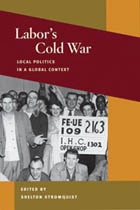REVIEWS
of Labor's Cold War: Local Politics in a Global Context
“American labor historians have maintained that Cold War anticommunism contained postwar militancy and undermined the labor movement’s ability to effectively respond to the growing diversity of the workforce, deindustrialization, mechanization, and conservative attacks on unions. Following recent work that seeks to understand how the anticommunist crusade played out in specific union locals and working-class communities (Robert Cherny et al., American Labor and the Cold War), this useful volume takes us to a surprising new array of Cold War theaters . . . . Importantly, editor Shelton Stromquist notes, several of the essays found that labor’s progressive agenda survived even as national politics shifted to the right and business launched an anti-union offensive.”
“In his study of Latino labor politics in Los Angeles, Kenneth C. Burt takes the Cold War labor declensionist narrative head on. He argues that social democrats replaced Communist leaders in new Latino civil rights coalitions of the 1950s that were far more robust and effective than earlier Communist-led organizations.”
– Kieran Taylor, American Studies
“One of the strengths of this volume is that, like most local histories, it introduces readers to individuals who had an impact on their community or union but who often have been forgotten in the national story. One meets . . . the Californians Tony Rios and Edward Roybal, the latter of whom, Burt notes, eventually became the first Latino congressman from the Golden State.”
“What this book demonstrates is that even during the Joseph McCarthy era, workers and labor organizers—at least on the local scene—were defending liberal or progressive politics. They were not as cowed by anticommunist spokesman as historians usually have portrayed; they were fighting for public hosing, fair employment, the right to unionize, even joining the few coalitions against racial discrimination.”
– Terry H. Anderson, The Journal of American History
“(William) Issel and Kenneth Burt offer positive evaluations of Catholic anticommunism. . . . Burt notes that Catholic officials in Los Angeles worked with left-wing Congress of Industrial Organizations (CIO) leaders until 1949 and contends that key activists supporting the anticommunist International Union of Electrical Workers (IUE) over the Union of Electrical, Radio, and Machine Workers of America (UE) in a 1952 representation election were part of the "liberal-left" (p. 134).”
– Martin Halpern, The American Historical Review
“This is a solid volume that pushes beyond rigid binaries and morality tales by illustrating the diverse and shifting networks of left, liberal, and conservative activists that shaped American Cold War political culture. Of the many themes these essays touch upon, two stand out in particular. First, the local studies are able to give readers a real sense of what was lost in these post-war political battles."
“Several other chapters contribute to another of the book’s central themes: the continuity of progressive politics in the post-war United States. Kenneth Burt, who makes the book’s most forceful case for such continuity, argues that in Los Angeles and California the ‘marginalization of many of those in and around the Communist Party did not represent the end of the labor community-civil rights alliance nor did it set back civil rights reforms’ (p. 79). He finds that progressive anticommunist networks in Los Angeles’ Latino community figured prominently in launching the political career of Edward Roybal and spearheaded the campaign for a fair employment law in California.”
– John Rosen, Labour History: A Journal of Labor and Social History (Australia)
“Three authors investigate conjunctures of anti-Communism with ethnicity and race. When Cold War politics and sectarian squabbles threatened labor-funded civil rights campaigns, Kenneth Burt argues, Los Angeles Latinos adroitly shifted from Communist to Socialist alliances to sustain fair employment drives.”
“Anti-Communism was also a grassroots impulse . . . Burt explains how reaction to the 1939 Nazi-Soviet Pact and the CPUSA’s 1948 endorsement of Henry Wallace helped splinter Left-labor coalitions in Los Angeles.”
– Jennifer Luff, Labor: Studies in Working-Class History of the Americas
